- Home
- Hanna Hamilton
The Lady And The Duke (Regency Romance) Page 3
The Lady And The Duke (Regency Romance) Read online
Page 3
“We head off to Margaret’s wedding the day after tomorrow. And then I’ll be on the post carriage at ten o’clock the morning after that. Maybe you could see me off.” Now Lydia began to cry as well.
They embraced, then Dorothea pulled away to discretely blow her nose and dab at her eyes with the handkerchief from her pocket.
“I must go before I become a sobbing mess and we both collapse into puddles of sorrow,” Dorothea said, as she gave Lydia a kiss on each cheek and swept out of the room.
Lydia sat on the edge of the bed. She looked around the room, trying to memorize its every detail, for she did not know when she shall be here again—if ever.
She walked around the room touching familiar objects and trying to decide what she absolutely needed to take with her. She wanted to travel light and start afresh in her new home. There was no point in taking anything she didn’t need. Certainly, her aunt would have books to read so she decided to take nothing with her other than her most essential necessities and one book to read on the journey.
She heard her mother calling from the dining room. It was time to go down.
She must be brave she told herself for the fourth or fifth time that morning. She would miss her lovely home, her mother, Margaret and, most especially, her father.
There would be no one to console her. She must stand alone, bear the grief by herself, and hope and pray that she might find a safe and welcoming harbor when she arrived at her new home. But Lydia realized and accepted the fact that she had no one but herself that she could count on.
* * *
Margaret’s wedding had been a raucous success. The wine, beer, and cider had flowed freely, and her father’s cheeks were even rosier than usual. Her mother sobbed on and off most of the day, and Margaret and Emily were now the proud married ladies of the three siblings.
The morning of Lydia’s journey, the sky was overcast. A cool wind blew in from the east and it seemed there would certainly be a storm brewing before long.
Papa had borrowed a carriage from a parishioner, as he did not have one of his own, to transport what was left of his family and Lydia’s luggage to the carriage stop in Piddlehinton.
Dorothea had come to see Lydia off. She was wrapped in a woolen knitted shawl, pulled tightly around her shoulders to keep out the wind.
Mother was the only one rattling on as they waited for the carriage.
“Here, this will keep you fed until you reach the first post house inn,” she said, handing Lydia a small basket. “There are several cheese sandwiches, a small prune cake and a flask of brandy if you get light headed riding in the carriage.”
“Thank you, Mother,” Lydia said.
She had her arm through her father’s, and she snuggled up close to him to shield herself from the bite of the wind.
Lydia turned to Dorothea. “Now, you will write, won’t you? I’ll depend on your biting observations on the foibles of our little village. No one else has quite your eye for shenanigans.”
“You can count on it,” Dorothea said, looking up at the sky. “I really should be getting home. I know it is going to pour down any moment and I cannot afford to catch a chill.”
“Go. Go,” Lydia said, disengaging from her father and embracing Dorothea. “I shall miss you,” was all she could say or she would burst into tears.
Dorothea ran off just as the post carriage came into view.
Her father once again counted all the pieces of luggage, although he had already done that three times since they arrived at the carriage stop.
Mother pulled her apron up to her face and covered her mouth in an attempt to stop from crying.
The clacking, bouncing, swaying carriage came to a stop in front of them. The huff and snort of pawing horses filled the air under the shouts of the drivers hoisting the luggage onto the carriage, as Papa assisted Lydia into her seat.
She opened the carriage window and leaned out, reaching out to take her parents’ hands.
Now her mother was covering her full face with her apron, trying to stifle sobs. Her father took her hand and just nodded as he couldn’t find the words to speak.
“All hail,” one of the drivers shouted. “Ho, ho…” He snapped the reins and the horses strained on the harnesses to start the carriage rolling.
“Good-bye, good-bye,” Lydia shouted as she strained to see them before her parents disappeared.
“Godspeed,” her father called out, and the carriage turned the bend leading out of the village and she could see them no more.
Lydia, back in her seat, took out her handkerchief, held it up to her eyes and pressed hard to help staunch the flow of tears.
After a short while, she was able to compose herself and she looked around the carriage. There were two other passengers—a middle-aged mother and her - what looked to be - ten or eleven year-old daughter.
“Are you traveling far?” the woman asked Lydia.
“To Shropshire,” Lydia answered.
“Oh, that will take several days will it not?”
Lydia nodded.
The woman rummaged in a large traveling bag. “Would you like an oatmeal and raisin biscuit? I made them for the journey. They are my Cynthia’s favorite. Oh, I am Betsy, and this is my daughter, Cynthia.”
“I am Lydia Fernside.”
“Pleasure,” Betsy answered.
“Thank you, but I am not hungry just now. I am still a bit upset about leaving my parents and my home.” Lydia said.
“Oh, I am sorry. That must be difficult,” she said as she handed her daughter the biscuit.
“It is.”
“Where are you going in Shropshire?” She closed her bag and set it on the seat between her and her daughter.
“Upton Magna. I am staying with my great-aunt.”
“For an extended visit?”
“Permanently. It is to be my new home.”
“Oh, my. That is a big change. Are you very fond of your aunt?”
“I have never met her. But she is kindly taking me in. She is elderly and I will be looking after her.”
“That is very kind of you.”
“Oh no, it is she who is being kind. My sisters are married and it seems it is time for me to be out in the world and earning my living.”
“You are not engaged, then?” Betsy asked, with just the slightest hint of disapproval.
“I am not,” Lydia answered firmly, and with no hint of an apology.
“Well, perhaps you will meet a suitable gentleman in Upton Magna. It is quite a lively community with many respectable citizens. I am sure your aunt will be able to introduce to many suitable gentlemen.”
“Anything is possible.”
Lydia had had quite enough of this conversation, and she turned and stared out the window at the passing countryside. Soon they entered another village and the carriage slowed down and stopped.
A new passenger boarded—an elderly, and rather heavyset, gentleman. And as the carriage started up again he introduced himself.
“Ladies,” he said, tipping his hat. “I hope you have had a pleasant journey thus far.”
Betsy nodded. “Agreeable enough. And where may you be heading, sir, if you do not mind me asking?”
“Not at all. I am on my way to visit the Duke of Shropshire, Edwin Templeton. Do you know him, perhaps?”
“I am not of that area,” Betsy said, “But our traveling companion, Miss Fernside, will be residing in Upton Magna, quite near the Duke’s residence, Honeyfield Hall.”
“Indeed. But you must excuse me. Let me introduce myself. I am Doctor Bernard Winston, at your service, ladies.
“Betsy Butley, and my daughter Cynthia.”
“Ladies.” He tipped his hat once again.
“Miss Fernside,” Lydia said in greeting.
“And you are from Upton Magna,” he said. “Then you must know His Grace, the Duke.”
“I am afraid I do not. This is my first visit,” she responded.
“Ah… Then you are in fo
r a most pleasant surprise. It is quite a charming village.”
“And you are a Doctor of…” Betsy asked.
“Philosophy. I am a professor at Trinity College, Oxford. Latin, Greek, and classics.”
“Do you know His Grace well?” Betsy asked. “I understand he only recently inherited his title.”
“Quite so. Unfortunately, the old Duke passed away less than a year ago. And the young Duke is still finding his bearings.”
“Have you come on business with the Duke?” Betsy asked.
“He was my student. It is just a friendly visit.”
“How nice that you have been able to keep close ties,” Betsy continued. “So many young men these days just fritter away their educational opportunities in partying, drinking and... other activities, she said discretely.
“Quite unlike the Duke, I assure you,” the Doctor said rather firmly.
Lydia did not wish to engage in this conversation as she observed that Mrs. Butley seemed to be more interested in gossip than serious enquiry. And it appeared that Doctor Winston felt the same, as he soon withdrew into reading a book.
The rest of the day’s journey was mostly uneventful. Lydia was still too upset to enjoy any of the food her mother had prepared, but she thought she might have that for dinner and not need to spend any money the rest of the day.
Just before dark, the carriage arrived at the Post House Inn
where they were to spend the night. This was the final destination for Mrs. Butley and her daughter and they bid farewell
Dr. Winston invited Lydia to dine with him in the Inn’s dining room, but she declined, as she was still emotionally distraught and extremely exhausted after the long day’s journey.
Later that evening she ordered a barley water from the dining room, ate a cheese sandwich, and retired to bed quite early.
Chapter 4
The next morning, the clouds, cold wind, and rain had disappeared and there was a freshness in the air. Lydia opened her casement window and stood to admire the bright sunshine.
She went to the dining room for a light breakfast and Doctor Winston nodded to her as she entered. He offered to share his table with her but she chose to sit alone as she wanted to enter an entry into her journal.
Waiting in front of the inn for the carriage to arrive with fresh horses, Lydia got into conversation, once again, with the professor. He reminded her of her father, as they were of the same age, and he too had rosy cheeks and a pleasant smile.
“How nice that we shall be traveling all the way to Upton Magna together,” he said. “I am sorry I was not of much company yesterday, but I am afraid Mrs. Butley put me off with her prying questions.”
“I quite understand,” Lydia said, “she seemed to disapprove that I was neither married nor engaged at my age.”
“Then let us have a pleasant travel day with light banter, or none at all, as we feel in the moment,” the Doctor replied.
The carriage finally arrived, their luggage was loaded, and they were soon on their way for the next leg of their journey. Fortunately, they had the carriage to themselves and they alternately gazed at the countryside, chatted, or retreated into their books.
They stopped at an inn for a light noon dinner and this time Lydia accepted the offer to dine with the professor.
During the conversation over Dover sole, boiled potatoes, and peas, Lydia asked, “Was Mr. Templeton a good student?”
“Oh yes, a fine student. He graduated with honors, although he seemed much more interested in horticulture than the classics. He was always bringing in cuttings, seedlings, or small packages of seeds into our tutorials. Many were the times when I would discover a dead plant or dried dirt between the cushions of the sofa. When focused on his studies he often became absent minded—not unlike me—and would leave without collecting all of his belongings.”
“So he is a man of the natural world?” Lydia asked.
“More specifically, flora. He was never one to dissect frogs or collect bugs on a pin.”
“I too love to garden. I am hoping my aunt will have space to put in a garden if she does not have one already.” She was almost on the verge of tears, once again. “We have the most beautiful orchard back home. I shall miss that most awfully.”
“Do not fret, my dear, every place has its own charms and I am sure you will find yourself right at home before you know it.”
“Thank you, Dr. Winston, you are most kind.”
After their meal, they continued their travels in silence for a short while before Dr. Winston suggested, “I have an idea, why not come visit me during my visit at Honeyfield, and I can introduce you to the Duke and his mother, the Duchess. She is somewhat indisposed, but I am certain we can all have tea together some afternoon.”
“That would be lovely. But I will need to consult with my aunt first to see what her needs will be before I can commit. After all, I am going there to serve her.”
“Certainly. But it would be a great treat to see you again before I go back to Oxford.”
After their repast and the recommencement of their journey, the Doctor soon drifted off into an afternoon nap and Lydia picked up her journal to make an entry, but the carriage was shifting and bouncing too much to write legibly and she soon put the journal aside and enjoyed the vistas outside the window.
Lydia had rarely travelled far from Piddlehinton so it was a treat to see other areas of the country. The rolling hills, streams, rivers, and vast fields, moors, and wooded areas delighted her. Soon she found herself dozing as well.
And then, while it was still light, they arrived at their next destination—The Golden Hind Hotel and Pub. The inn was on a lively rushing river and the soothing sound of water led Lydia to believe she would sleep soundly that night.
“If you are free and so inclined, shall we share the evening supper in the dining room?” the Doctor asked.
“Certainly, Dr. Winston, I would be delighted.”
“And I would like you to be my guest. I know traveling can be expensive. The Duke has kindly sent me my traveling expenses, and they are way in excess of my modest needs, so I hope you will accept my offer.”
“Very kind. I will accept, thank you.”
Lydia was directed to her room. It was quite small, with a rather suspect bed, but the window at the back of the hotel opened onto the river that provided a lively and most pleasing sound.
Lydia removed her bonnet, opened her traveling valise, and removed her journal and wrote the entry she’d not been able to write in the carriage.
It was still an hour until she was to meet the Doctor for dinner, and, as she was tired, she lay down on the bed for a short nap.
When she awoke it was completely dark. She struggled to light a candle and checked the timepiece her father had given her as a parting gift. It was two o’clock in the morning.
“How can this have happened?” she exclaimed, bereft that she had disappointed the Doctor by not appearing for dinner, and with no explanation. It upset her greatly.
But there was nothing she could do at this hour, so she undressed and got back into bed. But she slept fitfully and ended up getting back up after only a few hours of thrashing and beating on her pillow.
She sat at the window and enjoyed the river and the flushing dawn until it was a decent hour to go down to breakfast. She was hungry, as she’d missed her supper last evening.
She entered the dining room with some trepidation, as she was certain to find the Doctor upset with her. She saw him sitting at a table and sheepishly went over to greet him.
When he saw her he jumped up with a pained expression on his face.
“Oh, my dear, I am so dreadfully sorry,” he exclaimed.
“Whatever for?” she asked, “It is I who am sorry beyond words.”
They stared, not comprehending each other’s statement, for a moment until Lydia spoke.
“Excuse me, Doctor, it is I who is at fault for missing dinner last evening.”
The Docto
r’s expression changed and he let out a hearty laugh. “No, it was I who missed dinner. I am mortified.”
Then Lydia laughed. “You missed dinner too?”
“I did. I had a terribly upset stomach from what I guess must have been an off piece of fish at dinner last noontime. I asked the innkeeper to contact you. Did he not find you in your room?”
Lydia laughed again. “I lay down for a nap and didn’t wake until this early morning. If he tried to knock at my door I never heard him.”
“Well then, shall we have breakfast? I am famished now,” the Doctor said.
“Yes, me too.”
* * *
Later that afternoon the carriage was within a few miles of reaching Upton Magna. Lydia was both excited and nervous. Her father had written ahead to Aunt Lavinia with Lydia’s travel schedule and time of arrival, but Lydia had no idea if she was to be met or if she must find her own way to her aunt’s house.
The Doctor turned to her. “My dearest child. It has been such a pleasure traveling with you.” He handed her his card. “If you would be so kind as to write your new address on the back of my card then I shall send you an invitation for tea with the Duchess when I can work out a date and time.”
“That would be lovely.” She wrote the address and returned the card to the Doctor.
He then handed her another card. “And this is my card for you to keep.”
The carriage pulled up in front of the Upton Magna Inn where there was a scurry of new passengers eager to board. Lydia and the Doctor exited the coach, and the Doctor was greeted by one of the Duke’s footmen, taking his luggage, and gesturing him toward the Duke’s carriage.
“Do you need any assistance before I leave,” the Doctor asked.
“Oh, no thank you. I am sure I can find my way if there is no one to greet me.” Lydia looked at the group of people around the carriage hoping to catch a glance from someone who might have come to greet her.
“But you have a trunk and several cases,” the Doctor added. “How will you manage? I can’t leave you here alone.”
Lydia became flustered. “I am sure my aunt must have made arrangements. Please don’t bother yourself. The Duke must be waiting for you.”

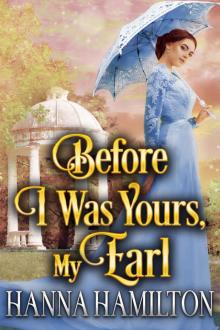 Before I Was Yours, My Earl: A Historical Regency Romance Novel
Before I Was Yours, My Earl: A Historical Regency Romance Novel The Stolen Diadem of a Castaway Lady: A Historical Regency Romance Novel
The Stolen Diadem of a Castaway Lady: A Historical Regency Romance Novel The Earl That Overruled My Destiny
The Earl That Overruled My Destiny Annabelle Enchants the Rejected Earl: A Historical Regency Romance Novel
Annabelle Enchants the Rejected Earl: A Historical Regency Romance Novel Diana Adores the Puzzled Duke_A Historical Regency Romance Novel
Diana Adores the Puzzled Duke_A Historical Regency Romance Novel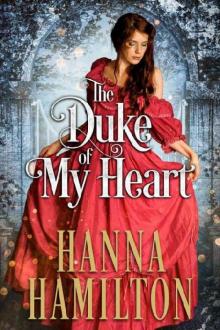 The Duke of My Heart (Regency Romance)
The Duke of My Heart (Regency Romance)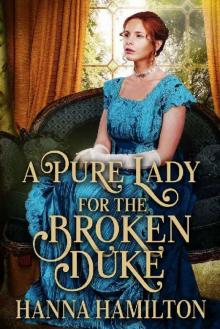 A Pure Lady for the Broken Duke
A Pure Lady for the Broken Duke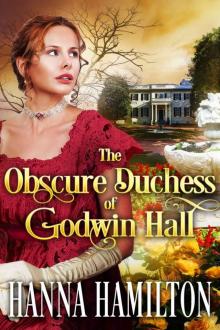 The Obscure Duchess of Godwin Hall_A Historical Regency Romance Novel
The Obscure Duchess of Godwin Hall_A Historical Regency Romance Novel A Charming Cavalryman for Clementine_A Historical Romance Novel Based on True Events
A Charming Cavalryman for Clementine_A Historical Romance Novel Based on True Events The Governess Who Stole My Heart: A Historical Regency Romance Novel
The Governess Who Stole My Heart: A Historical Regency Romance Novel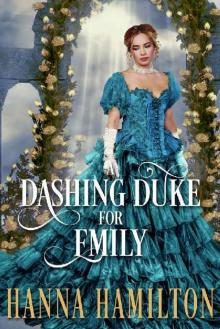 A Dashing Duke for Emily_A Historical Regency Romance Novel
A Dashing Duke for Emily_A Historical Regency Romance Novel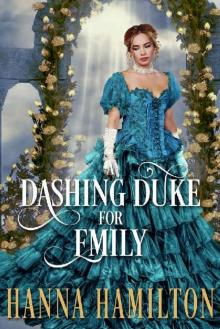 A Dashing Duke for Emily
A Dashing Duke for Emily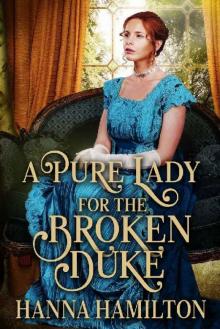 A Pure Lady for the Broken Duke_A Historical Regency Romance Novel
A Pure Lady for the Broken Duke_A Historical Regency Romance Novel The Scandal of the Deceived Duchess: A Historical Regency Romance Novel
The Scandal of the Deceived Duchess: A Historical Regency Romance Novel The Legend of the Betrayed Duchess_A Historical Regency Romance Novel
The Legend of the Betrayed Duchess_A Historical Regency Romance Novel The Scandalous Saga of the White Lady: A Historical Regency Romance Novel
The Scandalous Saga of the White Lady: A Historical Regency Romance Novel